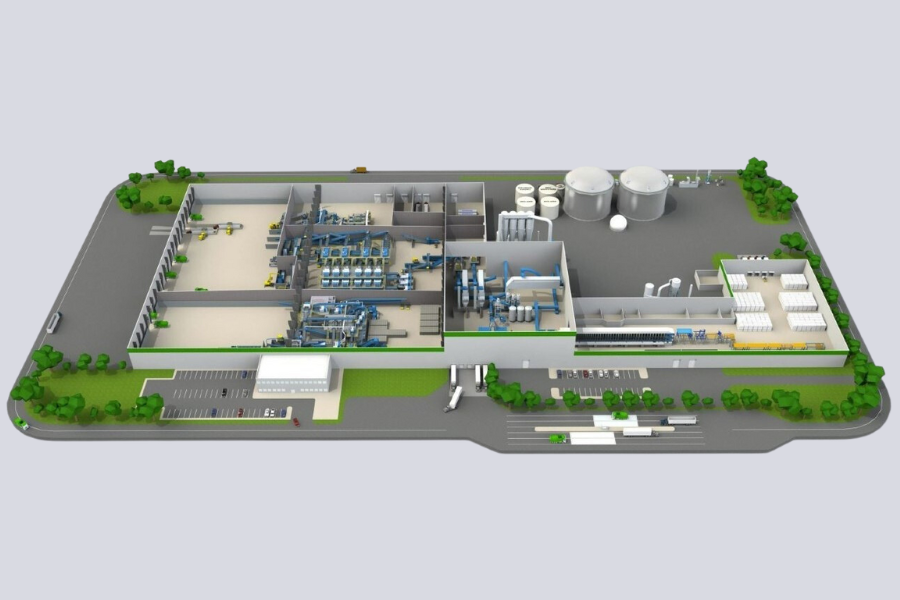
An organics site in Kent County, Mich. would serve as an anchor to a sustainability-focused business park. | Courtesy of Anaergia
A U.S. state and the Canadian federal government have recently put millions of dollars into large-scale anaerobic digestion projects. The following are details on the projects in Michigan and British Columbia.
Michigan provides funding for digester project
The state of Michigan will put $5 million into a project to build an anaerobic digester to serve as an anchor for one county’s planned Sustainable Business Park.
The Michigan Public Service Commission awarded the $5 million grant to Kent County Bioenergy Facility LLC, which is a subsidiary of anaerobic digestion technology company Anaergia. The company is working with the Kent County Department of Public Works to develop an estimated $380 million bioenergy facility that will process organics from trash bins into natural gas and fertilizer.
The facility is planned to serve as an anchor tenant in the Kent County Sustainable Business Park, which is a key tool in helping the county divert 90% of its waste from the local landfill by 2030, according to an Anaergia press release. The facility is expected to initially divert over half of MSW, converting organics into gas and fertilizer and recovering non-degradable recyclables for recycling markets.
“Kent County has a real opportunity to create a better world for future generations by building the Kent County Bioenergy Facility and Sustainable Business Park,” Dar Baas, director at the Kent County Department of Public Works, stated in the release.
The grant is called a Low Carbon Energy Infrastructure and Development grant.
The bioenergy facility still needs final approval from local elected leaders, including the Kent County Board of Commissioners.
Other state funds have recently flowed to Kent County, which is home to Grand Rapids. The county received a $4 million state budget appropriation to help develop infrastructure for the Sustainable Business Park, and the Michigan Department of Environmental, Great Lakes and Energy (EGLE) in April awarded two grants totaling $906,000 to the county’s public works department to buy a baler and a loader vehicle, expand a drop-off recycling center and install sorting robots at its MRF.
For Anaergia, the funding comes at a time of numerous changes for the Ontario-headquartered company. The company operates and owns a majority of the sprawling Rialto Bioenergy Facility, a Southern California anaerobic digester that recently filed for Chapter 11 bankruptcy to restructure debt. In a press release, the company cited delays in the city of Los Angeles’ implementation of the state’s mandate to provide composting service to residents.
Since that filing, the company has announced a new CEO and chief financial officer. It has also received funding from the state of California to fund a digestion facility serving part of Monterey County.
Canada supports anaerobic digester collaboration
The Canadian federal government has put millions of dollars into a joint project undertaken by a tribe and a Vancouver, British Columbia company to build an anaerobic digester for residential and commercial organic scraps.
Natural Resources Canada has provided a grant worth 14.4 million Canadian dollars (nearly $10.8 million U.S.) to fund the project by Andion Global and the Semiahmoo First Nation, according to a press release.
Andion is a Vancouver-based anaerobic digestion technology company with operations in North America and Europe. The Semiahmoo First Nation is a transboundary Indigenous nation that historically resided on both sides of today’s U.S.-Canada border and now has a reservation in South Surrey, British Columbia, a stone’s throw from the U.S. border.
The anaerobic digester, which is slated to be built on reservation land, will process organics from homes and businesses in British Columbia into renewable natural gas (RNG) and a fertilizer, according to the release. The methane will be distributed to customers through the FortisBC pipe network, displacing fossil fuel-based natural gas.
The Semiahmoo RNG project, which will be jointly owned by Semiahmoo First Nation’s economic arm and Andion North America, has now moved into the closing phase thanks to the federal government funding, the release notes.
“We have carefully and thoughtfully chosen a project that aligns with our core values to preserve and protect the natural environment, while bringing economic benefits to the nation,” Semiahmoo Chief Harley Chappell stated in the release. “This project set a new precedent in B.C. for environmental stewardship by creating clean, carbon-negative renewable energy.”
The project isn’t the first large-scale organics processing plant planned for the heavily populated region of B.C. known as the Lower Mainland. In covering this project, publication DailyHive.com noted that an organics processing facility planned for Burnaby, B.C. has been sent back to the drawing board over concerns about its environmental impacts. That project was slated to go on undeveloped public parkland along the Fraser River.


